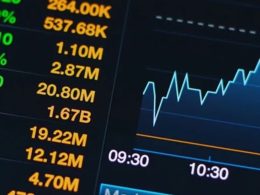by Gabriel Sauma, Russell Investments
After a punishing year for equities, are managers feeling more optimistic about a 2023 rebound in some parts of the world?
The answer, according to our latest equity market outlook: Yes, particularly in Europe and China.
While market volatility is expected to continue through the early part of 2023, given the ongoing macroeconomic uncertainty around the economic downturn, equity managers have nevertheless turned cautiously optimistic on some regions. This is true in both Europe—where deep recessionary fears appear to have been overdone—and in China, where the country’s broad post-COVID-19 reopening has unleashed positive sentiment. Government stimulus and thawing relations with the West in the wake of China’s National Party Congress last October are also boosting manager sentiment in China. Both Europe and China also seem to have valuation support, and have benefited from the ongoing weakness in the U.S. dollar.
Our outlook also shows that a reversal in the recent easing of inflation and a sharper-than-anticipated economic downturn remain top concerns for investors this year. Managers also expressed worries over a further escalation in tensions with Russia as a result of its ongoing war with Ukraine. On the other hand, manager concerns over a potential conflict between China and Taiwan eased during the fourth quarter.
On balance, the final quarter of 2022 was marked by a bout of optimism, which drove a broad recovery across markets. All markets delivered strong absolute returns during the fourth quarter— particular in U.S. dollars, given the weakness in the greenback during this period—with Europe the standout performer. The quarter proved to be a more favorable environment for active managers in Global, Global ex-U.S., U.S. large cap, U.S. small cap, Europe, UK, Emerging Markets, Canada and Japan, while being more challenging for long/short, Australia and listed real assets managers.
The value factor was the standout performer across all regions, while growth, quality and low volatility lagged with varying degrees across most regions. Low volatility performed a bit better in U.S. equities, as managers have increasingly been positioning more defensively. As such, style remained a driver of performance dispersion.
Energy continued to be the best performing sector across most regions during the fourth quarter, with the exception being Emerging Markets and Australia—two regions where fears of a recession are not as deep as previously anticipated. Other more cyclical sectors, such as financials, materials and industrials, also generally outperformed across regions.
Drawing on our unique relationship with underlying managers, we’ve compiled these and other insights from specialists across the manager universe into an easy-to-read report. Listed below are the chief tactical observations from key equity and geographic regions around the globe during the fourth quarter of 2022.
*****
Australian equities
Australia expected to avoid recession
- Despite slowing global economic growth and rising interest rates, managers are not expecting the Australian economy to enter a recession. Demand for resources and strong employment—which supports the consumer’s rising cost of living—are the basis for this view.
- Managers remain wary of companies that can’t pass on rising input costs, are highly geared or operate in discretionary sectors.
Tailwinds from China
- Both the post-COVID reopening of the Chinese economy and the significant improvement in Chinese-Australian diplomatic relations are tailwinds for the Australian economy.
- Evidence of the thawing in this diplomatic relationship occurred in January, when the first order of coal from a Chinese company in two years was received.
- Education is a top-five export product for Australia and, prior to the pandemic, one-third of international students were from China. Chinese students, however, have yet to return to Australia, with 53% fewer Chinese students in September 2022 than in September 2019.
Managers maintaining resources and energy overweights
- Managers held on to their resources and energy holdings in the fourth quarter, and in some cases, entered into new names. Resources holdings are weighted to metals exposed to the electrification theme, rather than iron ore. Managers expect demand for these metals to be strong, and supply is limited.
Gold shines
- Both value- and growth-biased managers either maintained or added to their exposure to gold-mining companies. While the company-specific reasons for holding are similar to metal miners, managers expect the sector to benefit in an inflationary environment.
Canadian equities
Investors see opportunity in financials
- Despite recession risks and mortgage exposure, managers believe Canadian banks present an attractive return proposition at current valuation levels.
- Despite headline sentiment related to mortgage-loan risk, investors believe that asset-backed loans present a limited risk of loss even in significant recessions. This is because capital ratios remain strong and valuations are historically low.
Increased focus on more predictable earnings
- The overall positioning across manager portfolios favors companies with stable earnings, as a result of recessionary risks.
- Although investors are cautious to invest in more cyclical sectors, opportunities in relatively more stable companies have sold off to attractive levels.
- A focus on consumer discretionary stocks involved with consumers trading down for less-expensive and more basic goods is a relatively common theme.
Energy and other commodities continue to be attractive, but investors are being more selective
- Overall, managers are still generally bullish on energy-related stocks, given the ongoing supply/demand imbalances globally. While the outlook is favorable, managers are being more selective within the space and emphasizing industry segments that are less dependent on commodity price increases.
- The outlook for other materials stocks is mixed. Investors tend to have a favorable view toward agricultural-related businesses and copper—the latter in large part driven by decarbonization trends and greater electrification. The outlook for gold and other metals is less positive.
Emerging markets equities
China’s brightening outlook
- China has fully emerged from three years of COVID-19-related lockdowns, with businesses reopening and a relaxation of international travel rules.
- Large cap consumer companies are expected to be the main beneficiaries of both the resumption in economic activity and increasing domestic demand.
- With lower tensions between China and the U.S., many managers have an increasingly positive stance on Chinese ADRs (American depository receipts).
- Real estate is a potential turnaround story, following new government policies that encourage banks to lend to developers and support a pick-up in consumer demand.
Challenges ahead for Indian equities
- Investors expect some headwinds given the combined effects of expensive market valuations, a potential global downturn and some reversal in 2022 capital flows back toward China.
Brazil political risks re-emerge
- After initial optimism over the election of Luiz Inácio Lula da Silva as president, markets sold off after he unveiled an aggressive fiscal agenda, with potential fiscal imbalances arising.
- Managers remain optimistic but cautious.
Growing commodity bull cycle
- Despite a strong 2022, materials companies remain largely underweighted by managers.
- A multi-year commodity downturn has seen miners develop better discipline on costs and fundamental strengths that have been overlooked by investors. Value managers see potential for a positive earnings surprise within materials.
Semiconductor downcycle expected to bottom out in 2023
- Managers are increasingly thinking about their exposure to the semiconductor cycle, with a trough largely expected in the second half of 2023.
Europe and UK equities
A time for Europe?
- Managers see a combination of bottoming negative sentiment toward European equities, combined with cheap valuations and low expectations, as an attractive backdrop for investors to begin increasing exposure to European equities in 2023.
High time for autos
- Negative sentiment toward the auto industry is at an all-time high and valuations are now in the 90th percentile relative to history.
- While some negativity is warranted, given the industry’s cyclicality and the ongoing electric-vehicle (EV) disruption, some managers believe this makes for a good entry point, as some transition winners will emerge.
Investors need to be discerning on the opportunity set
- While overall European equity valuations are attractive relative to other regions and history, this isn’t uniform across the opportunity set.
- Valuations in the higher quality segment of the market remain high, and some names are at risk of further derating if sentiment weakens.
Policy remains supportive of industrial and green capital expenditures
- Recent market volatility is unlikely to disrupt the European focus on shoring up and strengthening its industrial and energy infrastructure.
- Fiscal policy toward those sectors—and particularly toward the green transition enablers—is likely to remain supportive.
UK consumer confidence continues to be weak, but…
- Managers believe that we are past the peak concern on inflation, and that the 2022 selloff in consumer-related names has created opportunities in this segment of the market.
Global equities
Recession concerns continue to drive defensive positioning
- While global stocks rose on early signs of moderating inflation in markets such as the U.S. and Europe, active managers remain cautious as the risks of macroeconomic deterioration and inflationary pressures persists. Managers are continuing to lean toward companies with stable earnings and strong pricing power—attributes which should allow them to better withstand an economic slowdown.
- Growth managers are cautious over multiple compression in less profitable companies, and have tilted toward more resilient quality-driven compounders.
Negative earnings revisions and better entry points expected
- Forward estimates reflect earnings growth in the year ahead, but managers continue to see initial negative revisions. Managers are remaining cautious and patient on potential entry points, despite the recent market decline and improving sentiment.
Reopening trade: China opportunities
- While China is usually overlooked by managers, the recent easing of its COVID-19 policies, coupled with a renewed focus on economic growth and the resumption of international travel, has led to an increasing interest and allocation to Chinese equities. In particular, leading Chinese internet businesses and companies are benefiting from a pickup in domestic consumption.
Widening opportunity set for value investors
- Value managers are optimistic with the new ideas presented by the broad decline in market valuations. Opportunities are now appearing within historically less-accessible sectors at higher valuations—notably, technology.
Valuation differentials lead to marginal rotation to Europe
- European markets have weighed more negatively on weak sentiment and rate hikes. Meaningfully lower multiples have led to a preference for European stocks, compared to their equivalent U.S.-listed peers.
Japan equities
Expectation inflationary pressures are peaking
- Many managers expect the global economy to slow down and inflationary pressures to ease in the first half of 2023.
- Growth managers remain wary of high-valuation stocks that are priced on policy rates remaining at current levels, while at the same time expressing interest in those that have corrected—and those whose valuations have become increasingly attractive.
- Value managers are increasing cyclical exposures by trimming defensive stocks on recovery and increased valuations.
Growing interest in banking sector
- The Bank of Japan (BoJ) has modified its yield-curve control policy by raising the allowable range of fluctuation for long-term rates to 50 basis points (bps). This has led to an expectation of further normalization of the central bank’s monetary policy, resulting in strong performance for the banking sector.
- While expectations for wage inflation are increasing, investors’ views remain mixed on the extent of the rise.
Mixed views on technology sector
- It has become a consensus viewpoint among managers that the semiconductor industry is going to face a cyclical downturn this year. However, views regarding the depth and length of the downcycle are mixed.
- Those who have a relatively bullish view believe the downcycle for semiconductors will be modest, and are expecting the diversification of production bases to continue boosting demand.
Japan’s earnings outlook looks relatively strong
- The domestic economy is expected to continue to recover, supported by the ongoing post-pandemic normalization and a recovery in inbound tourism due to China’s reopening.
- Capital-expenditure estimates are relatively strong, driven by production shifts to Japan. There continues to be an increased investment in solutions for improved energy efficiency, as well as in automation—in order to accommodate the country’s aging and declining population
Long/short equity
Hedge funds enter the new year with historically low gross and net exposures
- Equity long/short hedge funds significantly delevered throughout 2022, with exposure hitting historical lows in October.
- Continued defensive positioning remains a potential headwind for equity long/short. If the market rallies, managers will have to adjust positioning or trail in the short-term.
Re-engaging in China and increased buying in Europe
- Hedge funds began buying back into China (mainly ADRs and H-shares) after consistently selling for most of the year.
- Managers have been favoring energy and healthcare, while continuing to sell large-cap tech (with exposure reaching a roughly four-year low in October.1
Short selling led 2022 performance
- 2022 was the best year on record for short alpha (with data dating back to approximately 20092) and the worst year for long alpha due to high levels of growth factor exposure.
- Despite the strong alpha generation from shorting, managers continue to find significant short ideas.
Real assets equities
China reopening
- Managers are evaluating China’s reopening following the ending of the government’s zero-COVID policy.
- Travel has resumed between Hong Kong and China, which will benefit sectors and companies economically linked to this theme.
- With COVID-19 quickly spreading post-reopening, the expectation is that China will reach herd immunity relatively quickly, meaning that the negative impact of lower mobility should be short-lived.
- Handicapping the different economic outcomes is very difficult, and managers still see the authoritarian government as a key risk.
- As China’s reopening takes hold, the likely beneficiaries could be airports in the Asia-Pacific region—due to increased travel—as well as retail sales, especially in Hong Kong and Japan, beginning in the March timeframe. However, this is by no means a consensus view among managers.
Global property
- Private property values are likely to decline in response to macroeconomic conditions.
- The listed property market has already discounted this value decline.
- Managers believe discounted investment opportunities may exist at a sector and company level, particularly relative to private opportunities, with data centers and healthcare having better prospects for rent growth.
Infrastructure
- Managers see public policy support for infrastructure investment remaining strong globally, especially for the replacement of aged infrastructure assets and the buildout of renewables.
- Utilities are in the midst of a multi-decade structural growth story. However, higher capex will need to be managed in the context of affordability, reliability and sustainability.
U.S. large cap equities
Positioning for a recession
- Following the rally in the fourth quarter, value managers are reducing their exposure to more economically cyclical sectors, particularly companies dependent on consumer spending.
- Growth managers are more sanguine on the economic outlook, but a raft of layoff announcements among large technology and financial companies suggests a return to prior high growth rates is not likely in the near-term.
Evolving capital allocation priorities
- With higher interest rates increasing their cost of capital, companies are increasingly cutting back on operating and capital expenditures and instead paying down debt.
- Managers are reducing exposure to lower-quality, more highly levered companies and increasing exposure to companies with strong balance sheets and sustainable cash flow.
Changing competitive landscapes
- Growth managers are reassessing the competitive moats for portfolio companies, with tighter financial conditions and reduced access to equity financing putting pressure on as-yet unprofitable business models.
- Managers across the style spectrum are increasing their holdings of companies with dominant market shares and more defensible competitive positions.
Valuations matter
- Both value and growth managers are welcoming the move away from zero interest rates, believing it removes speculative excesses from the market and places a premium on differentiated (or detailed) fundamental analysis.
- In this context, the current wide valuation spreads prevailing in the market should afford ample opportunity for adding alpha.
U.S. small cap equities
Managers view small caps as the most attractive segment of the U.S. equity market
- Managers acknowledge that small caps are inherently riskier during economic downturns, but believe these risks are already in the valuations. They have been highlighting that small caps are now over 25% cheaper than large caps. Managers are also pointing out that small caps are roughly 20% cheaper than their long-term averages computed over 30 years, while large caps are approximately 10% more expensive.
Managers expect active management to remain favorable
- Managers expect the ongoing end of easy money to continue to support quality stocks. This is generally favorable for active management in small caps, as large sections of small caps are not profitable.
Market-oriented managers positioning for a strong 2023
- Managers with flexibility in their process to invest in defensives or pro-cyclicals are now positioning for a strong cyclical rebound in 2023. They believe most of the pessimism is already priced in, and they expect data to improve.
Value managers turn cautious on financials, but are adding back to energy
- Value managers are concerned about the earnings outlook of companies. They believe the impact of the U.S. Federal Reserve raising interest rates tends to hit the economy with a lag. As such, they are now expecting credit quality issues in the near future. After trimming energy exposure in the second half of 2022, value managers are beginning to add back to the sector.
Growth managers see opportunities in cyclicals
- Growth managers are betting on a soft-landing of the economy, and are beginning to see opportunities in cyclical growth stocks such as transports—i.e., truckers, semiconductors and building products. Meanwhile, they are staying cautious on software and biotech.
The bottom line
An overall moderation in inflation, combined with expectations for a shallower-than-expected recession, has led to a more cautiously optimistic outlook among equity managers in early 2023—particularly for Europe and China. However, a high degree of uncertainty still exists over the depth and longevity of a potential economic downturn, as well as the extent of the deceleration in inflation. In such an environment, we believe the views of specialist managers will be critical to identifying and exploiting both risks and opportunities. We look forward to continuing to share these insights with you as the new year unfolds.
1 Source: Morgan Stanley Prime Brokerage
2 Source: Morgan Stanley Prime Brokerage















